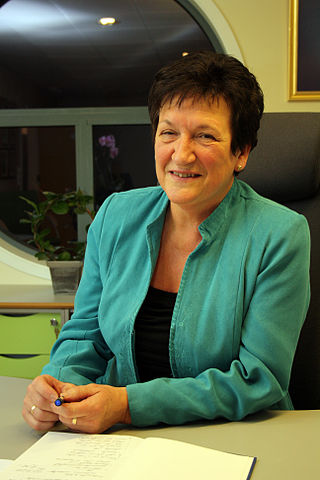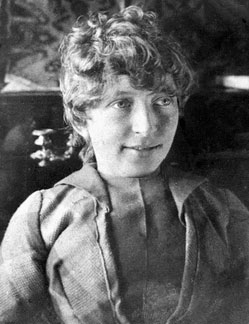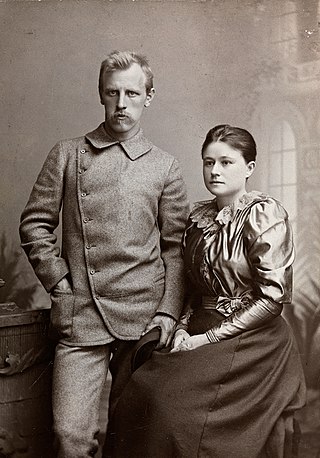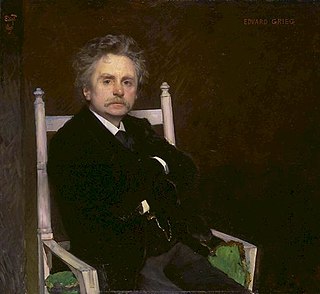
Asker, properly called Askerbygda in Norwegian, is a district and former municipality in Akershus, Norway. From 2020 it is part of the larger administrative municipality Asker, Viken in Viken county, together with the traditional Buskerud districts Røyken and Hurum; Asker proper constitutes the northern fourth and is part of the Greater Oslo Region. The administrative centre was the town of Asker, which remains so for the new larger municipality. Asker was established as a parish in the Middle Ages and as a municipality on 1 January 1838.

Arne Garborg was a Norwegian writer.

Hulda Garborg was a Norwegian writer, novelist, playwright, poet, folk dancer, and theatre instructor. She was married to Arne Garborg, and is today perhaps best known for kindling interest in the bunad tradition.

Hill-Marta Solberg is a Norwegian politician for the Labour Party. During her career, she was a parliamentary representative for Nordland county from 1993-2009. She was the Minister of Health and Social Affairs for three years and then was the County Governor of Nordland county for nearly ten years. She retired on 15 November 2018.

Mabel Bowden Howard was a well-known New Zealand trade unionist and politician. She was the first woman secretary of a predominantly male union.

Haugtussa is an epic circle of poems, written by the Norwegian author Arne Garborg. The poems are reckoned a classical example of Norwegian Neo-romanticism or Symbolism. The themes of the poems are closely related to Garborg's rural background, and a number of supernatural beings, like the draug, the hulderpeople and other creatures, are involved. A Haugtusse is originally a female subterrestrial, but in this story it is an eponym of the main character, a psychic young girl, usually called Veslemøy. In 1900 Garborg published a sequel, I Helheim.
Sara Rosalie Wahl was an American lawyer and judge and the first woman to serve on the Minnesota Supreme Court.

Johan Christian Heuch or J. C. Heuch was a Norwegian bishop in the Church of Norway and politician for the Conservative Party.
Kaare Krabbe Filseth was a Norwegian newspaper editor who was killed during the occupation of Norway by Nazi Germany.

Ida Cecilie Thoresen Krog was a Norwegian women's rights pioneer and Liberal Party politician, and the first female university student in Norway. She became famous when she was allowed to submit to examen artium in 1882, after an Act amendment had taken place. She was the first president of the women's rights association Skuld and a co-founder and vice president of its successor, the Norwegian Association for Women's Rights. She was also a co-founder and board member of the Norwegian Women's Public Health Association. She was active in the Liberal Party and her liberal views also colored her involvement in the women's rights movement. She was elected a deputy representative in Christiania City Council for the Liberal Party in 1901, as one of the first women elected to a political office in Norway.

Eva Helene Nansen was a celebrated Norwegian mezzo-soprano singer. She was also a pioneer of women's skiing.

The Norse-American Centennial celebration was held at the Minnesota State Fair on June 6–9, 1925.
Borghild Rud was a Norwegian artist and illustrator.

Haugtussa, Op. 67, or The Mountain Maid, is a song cycle for soprano and piano composed by Edvard Grieg in 1895 and published in 1898. Even though Grieg wrote a total of 181 songs, this is the only song cycle in his entire output. The text was written by the Norwegian writer Arne Garborg, an excerpt from his book of poetry Haugtussa. It tells the story of Haugtussa, a young herding girl, and her first love affair with a boy, her first heartache. Both the lyrics, which brim over with imagery of gurgling brooks and tasty blueberries, and the music that mimics this imagery, intertwine the main character’s personal story and the mystic spring-like landscape that surrounds her, which may even motivate it.

The feminist movement in Norway has made significant progress in reforming laws and social customs in the nation, advancing the rights of the women of Norway.
Sarah Powers Bradish (1867–1922) was an American writer. She is known for her textbook Old Norse Stories, published in 1900, and a memoir titled ... Stories of Country Life.
Muus v. Muus was an 1879 court case in Holden Township, Goodhue County, Minnesota. Divorce in Minnesota's nineteenth century Norwegian-Lutheran community was a rarity. Legal separation between a leading pastor and his wife was unheard of. But an 1879 court case in Holden Township led to both those outcomes, and triggered a public debate about married women's legal rights.

Mabel Simis Ulrich was an American medical doctor and health educator, lecturing nationally on sex and hygiene for the YWCA. She also wrote, owned several bookstores, and ran the Minnesota Writers' Project during the 1930s.

Margaret McFadden was an American community leader, prominent in philanthropic, church, and women's organizations. She served as president of the Minnesota Public Health Association, and the Guild of Catholic Women, the latter being one of the leading and most powerful religious organizations in the region where she lived. She was also involved in charitable work to improve the lives of veterans and the poor.

Beatrice Gjertsen Bessesen was an American operatic soprano. She was the president of the Twin City Music and Dramatic Club. Bessesen sang with the St. Olaf Choir and toured with it in Norway. She made successful concert tours in the U.S. and Europe, appearing with various European opera companies. She sang in practically all the leading centers of Europe, and was the prima donna in many big operas. She was a strong factor in developing cultural and artistic appreciation among Norwegian Minnesotans. She is the namesake of the Bessesen Building, which is on the National Register of Historic Places listings in Minnesota.














